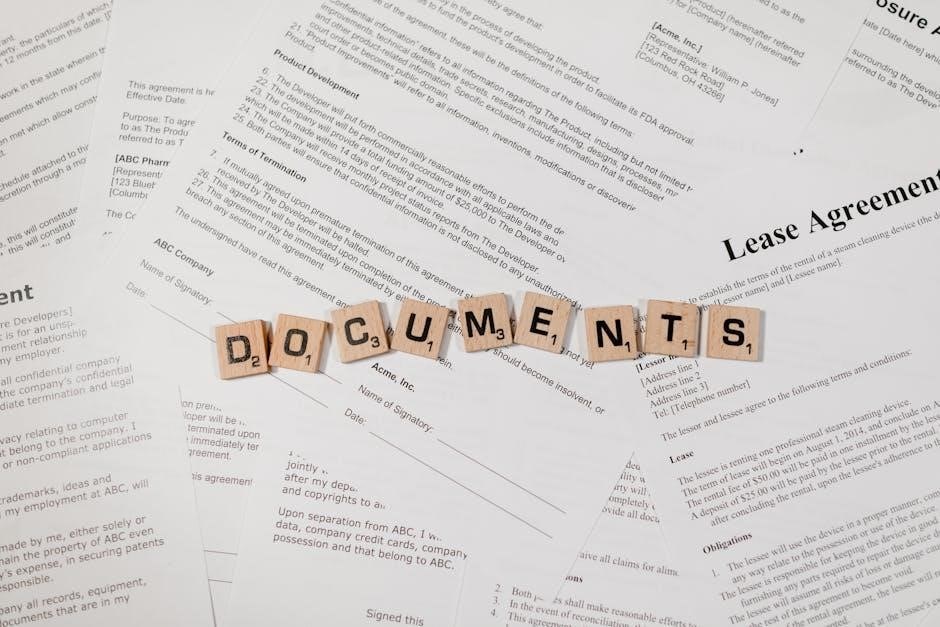A Massachusetts Lease Agreement PDF is a legally binding document outlining rental terms between landlords and tenants. It ensures clarity on rent‚ duration‚ and responsibilities‚ complying with state laws.
1.1 Definition and Purpose
A Massachusetts Lease Agreement PDF is a legally binding document that formalizes the rental relationship between landlords and tenants. It defines the terms and conditions of property use‚ including rent‚ lease duration‚ and responsibilities. This agreement ensures both parties understand their obligations‚ preventing disputes and providing a clear framework for resolving issues. It is essential for compliance with Massachusetts landlord-tenant laws and maintaining a formal rental arrangement.
1.2 Importance of a Written Lease Agreement in Massachusetts
A written Massachusetts Lease Agreement is crucial for establishing a clear‚ legally binding relationship between landlords and tenants. It outlines rent‚ term‚ and responsibilities‚ reducing disputes. Massachusetts law requires leases over 12 months to be in writing‚ ensuring both parties are protected. This document also provides a reference for resolving conflicts and ensures compliance with state-specific rental laws and regulations.

Key Components of a Massachusetts Lease Agreement
A Massachusetts Lease Agreement includes essential details such as lease term‚ rent‚ security deposits‚ tenant and landlord responsibilities‚ and compliance with state laws to ensure a clear agreement.
2.1 Lease Term and Rent Details
The lease term specifies the start and end dates of the tenancy‚ which can be fixed or month-to-month. Rent details include the amount‚ payment methods‚ due dates‚ and late fee policies. Both parties must sign the agreement‚ ensuring clarity on financial obligations and lease duration‚ with compliance to Massachusetts state laws governing rental agreements.
2.2 Security Deposit and Fees
A security deposit in Massachusetts is limited to one month’s rent and must be held in a Massachusetts bank account. Landlords are required to provide written notice of the account details. Annual interest of 5% must be paid to the tenant. Any deductions from the deposit must be itemized and justified in writing‚ with remaining amounts returned within 30 days of lease termination.
2.4 Tenant and Landlord Responsibilities
A Massachusetts lease agreement outlines the obligations of both tenants and landlords. Tenants are responsible for paying rent on time‚ maintaining the property‚ and complying with lease terms. Landlords must ensure the property is habitable‚ address repairs‚ and provide essential services. The lease should detail these responsibilities to avoid disputes and ensure compliance with Massachusetts landlord-tenant laws‚ promoting a fair rental relationship;
Massachusetts Lease Agreement Laws and Disclosures
A Massachusetts lease agreement must comply with state laws‚ including required disclosures about security deposits‚ lead paint‚ and eviction processes. It must avoid prohibited practices like unfair rent increases or illegal fees‚ ensuring transparency and fairness for both parties.
3.1 Required Disclosures by Massachusetts Law
Massachusetts law mandates specific disclosures in lease agreements‚ such as security deposit terms‚ lead paint notifications‚ and eviction procedures. Landlords must also disclose their responsibilities regarding property repairs and utilities. These disclosures ensure transparency and legal compliance‚ protecting both landlords and tenants from potential disputes or legal issues. Failure to include required disclosures can result in penalties or legal consequences for non-compliance.
3.2 Prohibited Practices in Lease Agreements
Massachusetts law prohibits certain practices in lease agreements‚ such as charging tenants for credit check fees or including clauses that violate tenant rights. Landlords cannot impose illegal penalties or require tenants to pay for repairs that are the landlord’s responsibility. Additionally‚ leases cannot include terms that contradict state or local laws‚ such as unlawful eviction procedures or discriminatory practices. Prohibited practices can lead to legal consequences for landlords.

Types of Massachusetts Lease Agreements
Massachusetts lease agreements include residential‚ commercial‚ and sublease agreements. Each type caters to specific rental needs‚ ensuring compliance with state laws and protecting both landlords and tenants.
4.1 Residential Lease Agreements
A Massachusetts Residential Lease Agreement is a fixed-term contract between a landlord and tenant for renting residential property. It outlines rent‚ utilities‚ and tenant responsibilities. The agreement must comply with Massachusetts laws‚ including those related to security deposits and tenant rights. Landlords may require a rental application to verify tenant eligibility. This document ensures both parties understand their obligations‚ fostering a clear and legally binding rental relationship.
4.2 Commercial Lease Agreements
A Massachusetts Commercial Lease Agreement governs the rental of property for business use. It outlines lease terms‚ rent‚ maintenance responsibilities‚ and specific clauses like exclusive use or parking rights. These agreements are often more detailed than residential leases‚ addressing unique commercial needs and ensuring compliance with Massachusetts laws. They provide a structured framework for landlords and tenants to operate within a business context effectively.
4.3 Sublease Agreements
A Massachusetts Sublease Agreement allows a tenant to lease property to a subtenant for a portion or remainder of the original lease term. It requires the landlord’s consent and outlines the subtenant’s responsibilities. This agreement is legally binding and must comply with Massachusetts laws‚ ensuring the original lease terms are upheld while transferring temporary rights to the subtenant.

How to Create a Massachusetts Lease Agreement PDF
Use templates or legal software to draft a Massachusetts Lease Agreement PDF‚ ensuring all clauses like rent‚ term‚ and security deposits are included and compliant with state laws.
5.1 Step-by-Step Guide to Drafting the Agreement
To draft a Massachusetts Lease Agreement PDF‚ start by identifying the parties involved‚ including names and addresses. Specify the lease term‚ rent amount‚ and payment methods. Include details about the security deposit and any fees. Outline tenant and landlord responsibilities‚ such as maintenance duties. Add required disclosures per Massachusetts law‚ like lead paint notifications. Finally‚ include signatures and dates‚ and consider attorney review for compliance.
5.2 Tools and Templates for Generating a Lease Agreement PDF
Utilize professional tools like LeaseRunners or airSlate to create a compliant Massachusetts Lease Agreement PDF. These platforms offer customizable templates‚ ensuring all state-specific requirements are met. They allow for electronic signatures and secure PDF generation. Additionally‚ websites like LegalZoom provide pre-drafted templates tailored to Massachusetts laws‚ simplifying the process for landlords and tenants. Always verify that the template includes necessary disclosures and clauses for legal compliance.

Benefits of Using a Massachusetts Lease Agreement PDF
A Massachusetts Lease Agreement PDF provides legal protection‚ clarity on rental terms‚ and ensures compliance with state laws‚ benefiting both landlords and tenants equally.
6.1 Legal Protection for Both Parties
A Massachusetts Lease Agreement PDF offers legal protection by clearly defining the rights and obligations of landlords and tenants. It ensures compliance with state laws‚ such as Chapter 186‚ providing a framework for resolving disputes. For landlords‚ it secures rent payments and outlines tenant responsibilities. For tenants‚ it protects against unfair practices and ensures repair obligations are met‚ creating a balanced and legally binding arrangement for all parties involved.
6.2 Clarity in Rental Terms and Conditions
A Massachusetts Lease Agreement PDF ensures transparency by clearly outlining rental terms and conditions. It details rent amount‚ payment methods‚ lease duration‚ and responsibilities of both parties. This clarity prevents misunderstandings and disputes‚ ensuring both landlords and tenants fully understand their obligations. The document also specifies rules for late payments‚ security deposits‚ and property maintenance‚ providing a clear framework for the rental relationship. This transparency fosters trust and accountability for all involved.

Common Mistakes to Avoid in a Massachusetts Lease Agreement
Common mistakes include omitting key clauses‚ such as security deposit terms or tenant responsibilities‚ and failing to comply with state laws. Ensuring all terms are clearly detailed and legally compliant is essential to avoid disputes.
7.1 Omissions in Key Clauses
Common omissions include failing to specify security deposit terms‚ tenant responsibilities‚ and landlord obligations. Missing clauses about rent payment details or repair responsibilities can lead to legal disputes. Ensuring all terms are explicitly stated is crucial for clarity and compliance with Massachusetts law‚ protecting both parties from potential conflicts or financial losses. Proper documentation of all agreements is essential.
7.2 Non-Compliance with State Laws
Non-compliance with Massachusetts laws‚ such as violating security deposit regulations or including prohibited clauses‚ can result in legal penalties or lawsuits. Landlords must adhere to Chapter 186 of the Massachusetts General Laws‚ ensuring all terms align with state requirements. Failure to include mandatory disclosures or follow rent control rules can lead to disputes and financial losses for both parties. Compliance is essential to avoid legal repercussions.

Massachusetts Landlord-Tenant Laws
Massachusetts landlord-tenant laws‚ primarily outlined in Chapter 186 of the Massachusetts General Laws‚ regulate rent‚ security deposits‚ and eviction processes. They protect both parties’ rights‚ ensuring fair rental practices statewide.
8.1 Overview of Chapter 186 of Massachusetts General Laws
Chapter 186 of the Massachusetts General Laws provides the legal framework governing landlord-tenant relationships. It covers key aspects such as lease agreements‚ rent regulations‚ eviction processes‚ and security deposit rules. The chapter ensures protections for both landlords and tenants‚ outlining obligations and rights. It also addresses termination notices‚ habitability standards‚ and prohibited practices‚ ensuring transparency and accountability in rental transactions across the state.
8.2 Rights and Responsibilities of Tenants and Landlords
Tenants have the right to a habitable living space‚ timely repairs‚ and protection from unlawful eviction. Landlords must maintain property safety‚ disclose lead paint hazards‚ and follow legal eviction processes. Tenants are responsible for paying rent‚ maintaining the unit‚ and complying with lease terms. Landlords must return security deposits within 30 days of tenancy termination‚ less any lawful deductions for damages or unpaid rent‚ as outlined in Massachusetts law.
A well-crafted Massachusetts Lease Agreement PDF ensures legal protection and clarity for both tenants and landlords‚ outlining responsibilities and rights under state law.
9.1 Final Thoughts on the Importance of a Proper Lease Agreement
A proper Massachusetts Lease Agreement PDF is essential for protecting both landlords and tenants legally. It ensures clarity on responsibilities‚ rent terms‚ and rights‚ fostering trust and preventing disputes. Compliance with state laws guarantees fairness‚ while clear terms avoid misunderstandings. A well-drafted agreement is vital for a smooth rental experience in Massachusetts.
9.2 Resources for Further Assistance
For further guidance on Massachusetts lease agreement PDF‚ consult official state resources‚ legal aid organizations‚ or professional associations. The Massachusetts government website offers detailed landlord-tenant laws and required disclosures. Legal aid services provide free advice‚ while organizations like the Massachusetts Apartment Association offer templates and educational materials. These resources ensure compliance and clarify any doubts about lease agreements.
